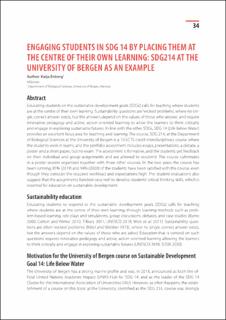Engaging students in SDG 14 by placing them at the centre of their own learning: SDG214 at the University of Bergen as an example
Chapter
Published version

View/
Date
2021Metadata
Show full item recordCollections
- Department of Biological Sciences [2235]
- Registrations from Cristin [9791]
Original version
In: Øvreås, L., Hansen, K., Fuller, J., Toman, I., van't Land, H. (eds.), Higher education and SDG 14: Integrating Ocean Research for the Global Goals, p. 34-41.Abstract
Educating students on the sustainable development goals (SDGs) calls for teaching where students are at the centre of their own learning. Sustainability questions are ‘wicked problems’, where no single, correct answer exists, but the answers depend on the values of those who answer, and require innovative pedagogy and active, action-oriented learning to allow the learners to think critically and engage in exploring sustainable futures. In line with the other SDGs, SDG 14 (Life Below Water) provides an excellent focus area for teaching and learning. The course, SDG 214, at the Department of Biological Sciences at the University of Bergen is a 10 ECTS credit interdisciplinary course where the students work in teams, and the portfolio assessment includes essays, presentations, a debate, a poster and a short paper, but no exam. The assessment is formative, and the students get feedback on their individual and group assignments and are allowed to resubmit. The course culminates in a poster session organised together with three other courses. In the two years the course has been running, 85% (2019) and 94% (2020) of the students have been satisfied with the course, even though they consider the required workload and expectations high. The student evaluations also suggest that the assignments function very well to develop students’ critical thinking skills, which is essential for education on sustainable development.